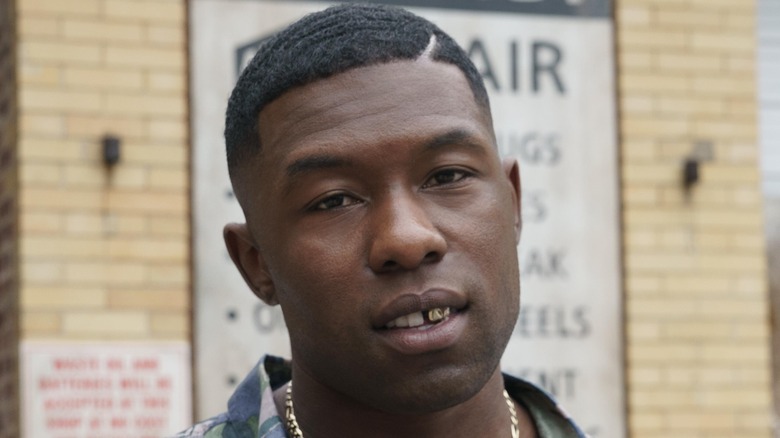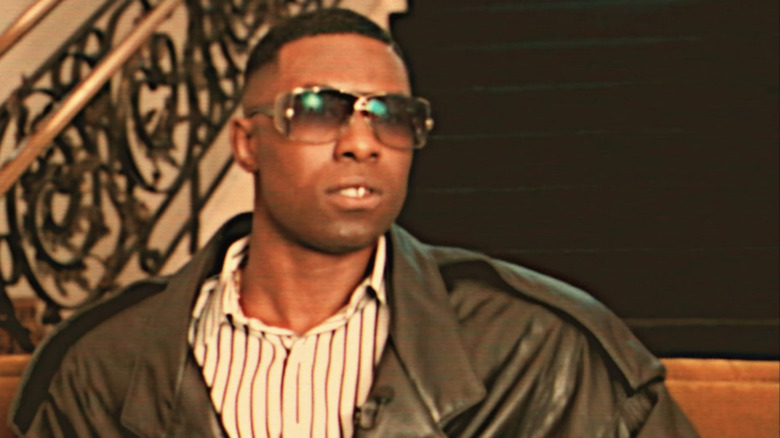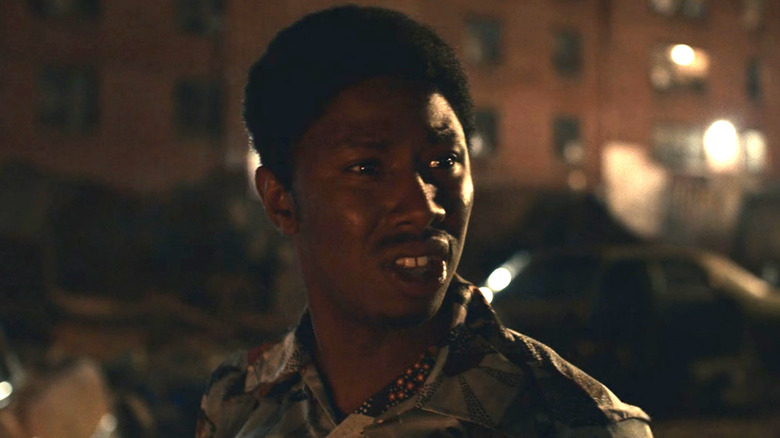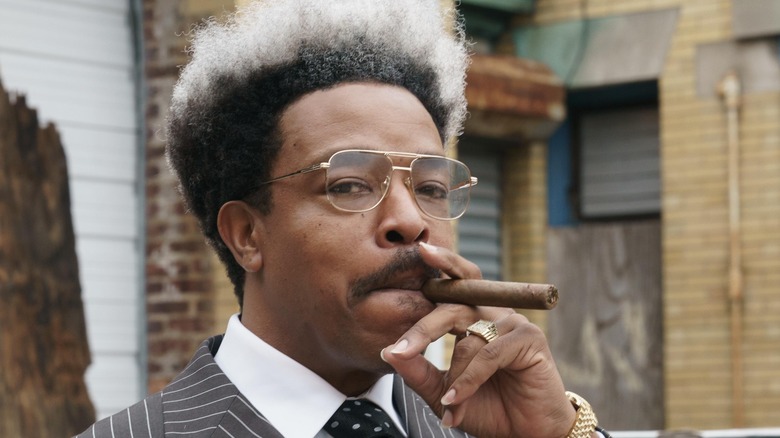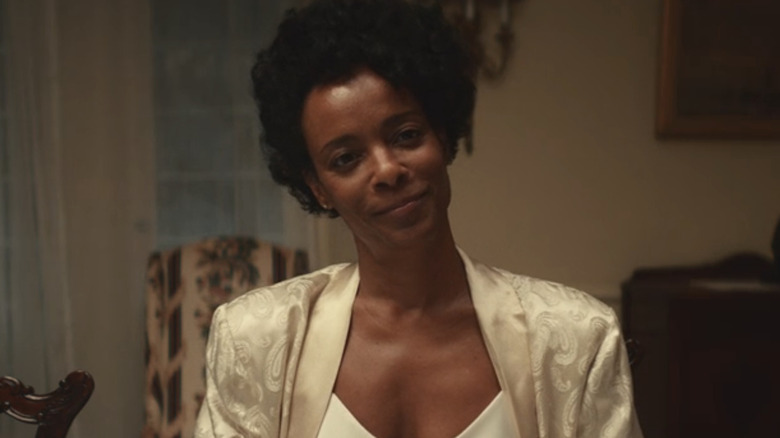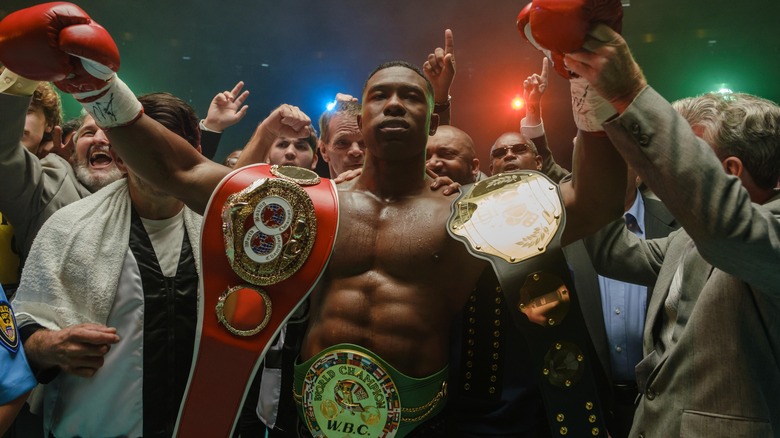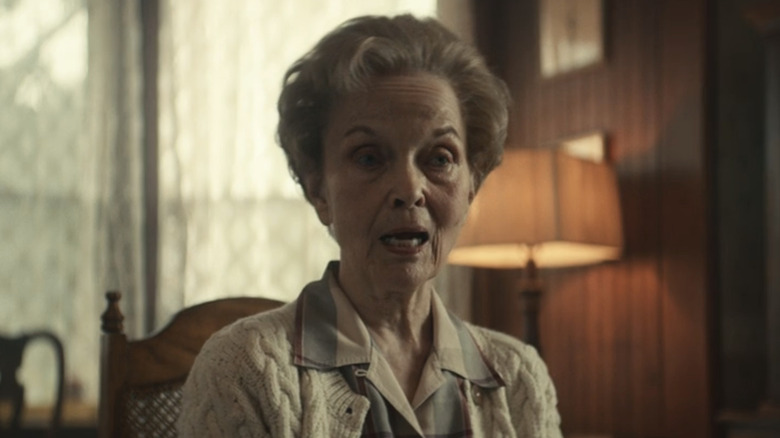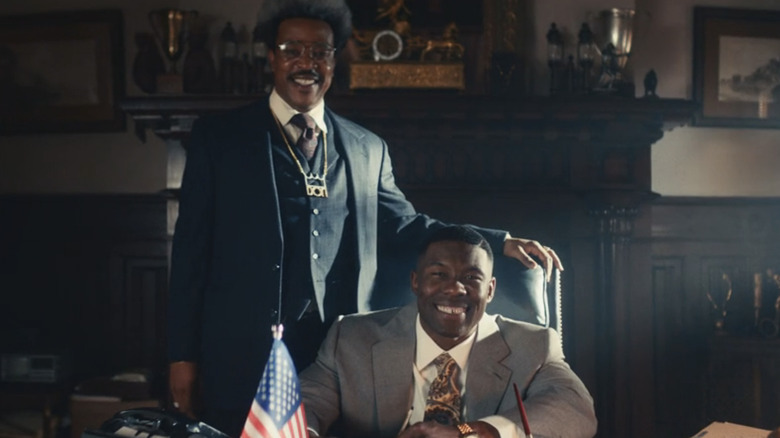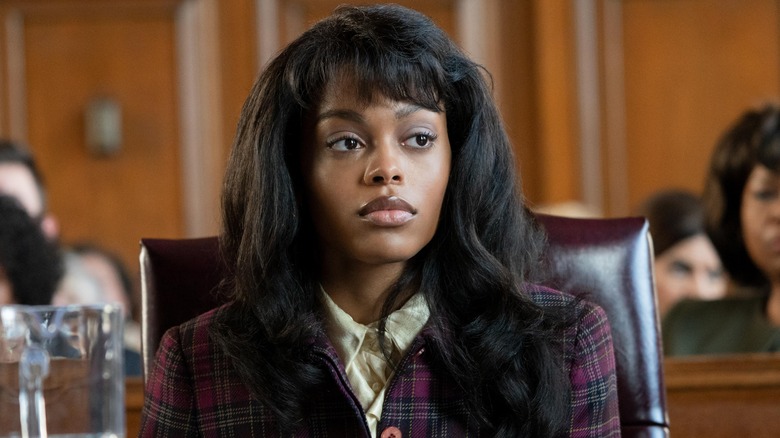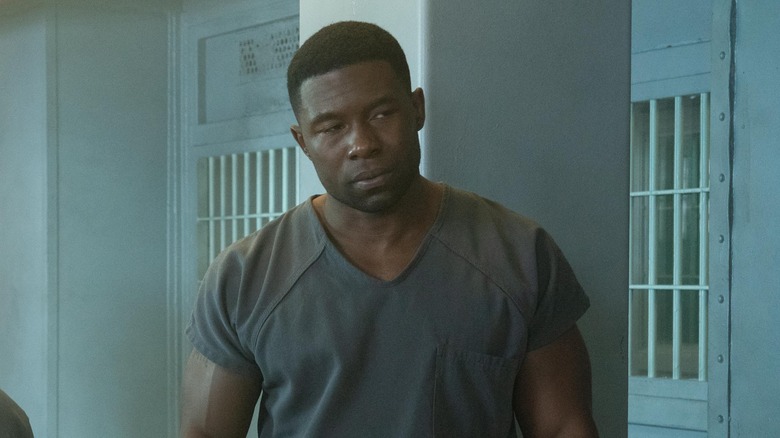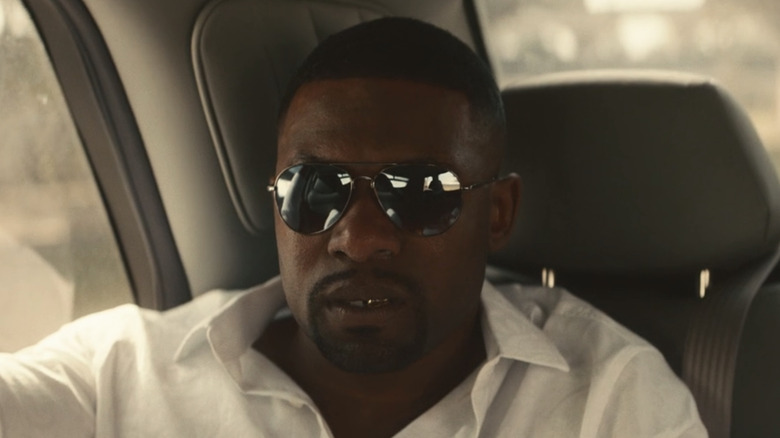What Mike Gets Wrong About The True Story
The Hulu miniseries "Mike," chronicling the life of boxer Mike Tyson (played by Trevante Rhodes), is a difficult show to fact-check. For one thing, most of the show's most outrageous elements are actually true. A ten-year-old Tyson really did beat up a bully who decapitated one of his pet pigeons. He really was the youngest heavyweight champion in history after defeating Trevor Berbick at age 20. He really did own a slew of wild game animals, including at least one white tiger. He really bit Evander Holyfield's ears in their 1997 rematch. He really bit Lennox Lewis on the leg during the press conference for their 2002 match. He really served three years in an Indiana penitentiary for the sexual assault of Desiree Washington.
But the other difficulty in fact-checking "Mike" is that, with one notable exception, the entire series is told from Tyson's perspective and in his words, either in voiceover narration, looking at the camera and directly addressing the audience, or through the one-man show that the series uses as a framing device. He is an unreliable narrator, and as an audience, we can't be sure if an event is depicted in a certain way because that's how it actually happened, or because that's how Tyson thinks — or wants us to think — it happened. Still, there are several moments in director Craig Gillespie's ("I, Tonya") eight-part series that stray from the written record, and other moments that might be factually true, but are presented in a manipulative way. Let's take a look at what "Mike" gets wrong about the true story.
Bad Interview
The series' first episode, directed by Gillespie and written by creator Steven Rogers (who also wrote "I, Tonya"), establishes its tone and structure, as Tyson performs a fictionalized version of his real-life one-man show "Undisputed Truth" before an audience in Indiana in 2017. From there we flash back to Tyson's harsh upbringing in the Brownsville neighborhood of Brooklyn (where he is played as a young boy and teen by Zaiden James, Ethan Barrett, and B.J. Minor), while also flashing forward to tease future events, such as his association with promoter Don King (Russell Hornsby) and his maiming of Evander Holyfield. We also get a glimpse of Tyson's combative nature with the media, illustrated by a television interview; when the reporter asks Tyson about being a convicted rapist, Tyson curses at him and leaves.
The scene is designed to look like an interview from sometime in the mid-1990s, in the midst of Tyson's comeback attempt after being in jail for three years, but its inspiration actually happened much later than that. In 2014 Tyson appeared on a news program on Toronto station CP24 to promote his upcoming "Undisputed Truth" performance. After mentioning that he had met with controversial Toronto mayor Rob Ford, anchorman Nathan Downer asked if it was appropriate for a convicted rapist to meet with the mayor in an election year. Tyson took offense at the question and hit Downer with a barrage of broadcast-unfriendly language before cutting the interview short.
Barkim
Tyson's childhood in Brooklyn is depicted as one of crime and uncertainty. Even after his fateful stint in an upstate New York juvenile detention center that brought him to the attention of famed boxing trainer Cus D'Amato (Harvey Keitel), Tyson would return to his old stomping grounds and get into trouble with his friend Barkim (played as a boy by Camden Coley and by T.J. Atoms as a teen). After Tyson's success at the Junior Olympics, Barkim lectures him for coming back to Brooklyn when his skills have given him a way toward a better life. "Look around," Barkim says in Episode 2, geturing to the burned out squalor of mid-1980s Brooklyn. "Ain't nothing here for you." Tyson's narration says that night was the last he ever saw of his friend; Barkim would be shot dead in the street just two months later.
Barkim's role in the miniseries is clearly as a cautionary tale, a vision of what Tyson's life could have come to if not for the opportunities provided by his phenomenal boxing skill. In the 2013 memoir based on his solo show, also titled "Undisputed Truth," Tyson writes about Barkim. In real life he was older than shown in the series, and would refer to Tyson as his "son" on the streets. Tyson writes about his time under Barkim's wing, but provides little further information about the man, not even a last name. As such, there is no evidence that the real-life Barkim died in the time and manner depicted onscreen.
Enter Don King
The first half of the miniseries uses each episode to focus on one important relationship in Tyson's life: First his mother Lorna Mae (Olunike Adeliyi), then Cus D'Amato, then his first wife Robin Givens (Laura Harring), and then his promoter and manager Don King. King's appearance is teased in the first episode, but he doesn't make his grand entrance until Episode 3, first acting as a mentor and confidante to the young champion during his rocky eight-month marriage to Givens in 1988.
The show plays fast and loose with the timeline here, making it seem as if King didn't enter Tyson's orbit until after he won the heavyweight title from Trevor Berbick in 1986. In reality, King, a former Cleveland numbers runner who reinvented himself as a boxing promoter after a stint in jail for manslaughter, was one of the promoters of that fight. The show leaves him out of its depiction of the Berbick fight in Episode 2 in order to emphasize the absence of D'Amato, who died before he could see his protege's greatest triumph. Tyson became heavyweight champion of the world as an orphan, having lost D'Amato and his mother in the preceding years, and King was more than willing to fill the role of surrogate father.
The Trump Connection
"Donald Trump has offered his consulting services. Now that's a businessman you can trust," Robin Givens' mother Ruth (Leslie Silva) mentions at the dinner table to her new son-in-law in Episode 3. She's concerned that Tyson's current managers, Billy Cayton (Kale Browne) and Jimmy Jacobs (Tim True), aren't handling his money as well as they should be. In the next scene, Don King offers his own assessment of Trump as he and Tyson commiserate: "That Trump's a tender-headed white boy, never had a callus in his life. Got his money from his daddy."
What the show fails to mention, however, is that the future United States president very much was involved with Tyson's career and finances during this time. Trump is a member of the New Jersey Boxing Hall of Fame due to the role that his Trump Plaza casino had in bringing big ticket boxing back to Atlantic City; the Plaza was so well known as a boxing mecca in the late 1980s that Will Smith name-checks it in the Fresh Prince and DJ Jazzy Jeff single "I Think I Can Beat Mike Tyson." A 1988 Washington Post article notes that the Tysons sought Trump's help before his June fight against Michael Spinks. "I said 'Hey Mike, these guys [Tyson's management team] are all ripping you off," Trump said. After the fight, Tyson enlisted the services of a lawyer recommended by Trump and sued Cayton (his partner Jacobs had died a few months earlier). After Cayton and Tyson parted ways, King acted as both Tyson's promoter and manager for the next decade.
The Wrong Spinks
The 1988 fight against Michael Spinks resulted in a first-round knockout for Tyson. It was both the first and last professional loss for former Olympian Spinks, who retired after the fight. The series briefly dramatizes the fight in a flash-forward in Episode 1, but there's just one problem: When the episode was originally posted, the onscreen graphic introducing the fight instead listed Leon Spinks, Michael's older brother and fellow prizefighter. The typo has since been corrected, but the screenshots and the anger among boxing fans remain.
For most audience members that would be a minor error, if one that was noticed at all, but for fight fans it speaks to the overall sloppiness and disinterest that the series has for depicting Tyson's actual boxing career. Despite the care put into recreations such as Tyson and Givens' infamous joint television interview with Barbara Walters, the fight scenes are often brief and perfunctory, mostly shot in the same anonymous boxing ring with a Budweiser promotion on the mat, no matter which company was actually sponsoring the fight. This is clearly a stylistic choice, but an especially frustrating one for anyone whose interest in Tyson stems from his time in the ring rather than his time in the tabloids.
Robin and Camille
An especially tense scene in Episode 3 has Givens and her mother confronting Camille Ewald (Grace Zabriskie), Cus D'Amato's widow, at her home in upstate New York over the fact that Tyson is paying her mortgage. Both Camille and Tyson, sitting with them, seem blindsided by the turn in conversation after what had started as a friendly visit. He takes Givens aside, furious that she would take that tone and presume to essentially evict his surrogate mother. Givens counters that Camille is not his real family, a statement that brings Tyson nearly to violence.
Despite being played by an actor as well-known as Zabriskie ("Twin Peaks," "Seinfeld"), "Mike" does little with Camille but to show her as a warm maternal figure to the fighters D'Amato brought home over the years, including Tyson. The scene is more about exposing the fissures in he and Givens' marriage, but in real life Ewald did not need Tyson to fight her battles for her. She was a formidable advocate for him over the years, just as likely to give him advice in his romance with Givens as to butt heads with her when she felt that Tyson's interests weren't being served. While it's true that Givens took issue with a monthly allowance Tyson paid Ewald (per the Washington Post), their confrontation was with one another, not Mike stepping in as protector. Ewald also publicly denounced Tyson being diagnosed as manic depressive and prescribed lithium, a situation she saw as a controlling tactic by Givens and her mother.
Punch-Out!!
Episode 4 charts Tyson's highest highs and ends with his (first) fall from grace. After his divorce from Givens in 1988, Tyson spends the next two years winning in the ring, spending extravagantly, and becoming more reckless in his drug and alcohol abuse. He officially hires Don King as his manager, he's baptized by the Rev. Jesse Jackson, and thanks to King, he has his likeness on a video game, the legendary "Mike Tyson's Punch-Out!!" for Nintendo. Everything seems to be going well for Tyson until he's knocked out by James "Buster" Douglas in the tenth round of their 1990 fight. Suddenly, Tyson's star feels diminished, and when he goes to a toy store to blow money on Nintendo systems for the neighborhood kids, he's shocked to find that his face is no longer on "Punch-Out!!"
The "Punch-Out!!" saga makes for a tidy metaphor, but it isn't quite the true story. In 1987, before King was Tyson's manager, Nintendo of America president Minoru Arakawa saw the champ fight and was impressed. The company was developing a home version of its arcade game "Punch-Out!!" and Arakawa suggested that they use Tyson as the final boss for scrappy fighter Little Mac to face. Tyson was signed to a three-year contract, and when it ended in 1990, Nintendo removed him from the game, substituting generic fighter Mr. Dream. While it's possible that Nintendo might have extended the contract if Tyson's personal and professional conduct at the time was more family-friendly, there's no evidence that he was removed from the game due to his loss to Douglas; the timing is coincidental.
Desiree Washington
Tyson's life has a number of dark chapters, but if any of them were going to defeat Gillespie and Rogers' motormouthed, often glib style, it would be his 1991 arrest and 1992 conviction for the sexual assault of 18-year-old Desiree Washington. To give this episode the care it needs, the show steps away from itself, both on- and off-camera. Gillespie turned director duties over to Tiffany Johnson, while Rogers shares script credit with showrunner Karin Gist and writer/producer Samantha Corbin-Miller. Instead of Tyson narrating, the episode has Washington (Li Eubanks) tell her own story, the story of a college-bound beauty pageant contestant who accepted a late night invitation from one of the most famous men in the world, never expecting that it would be "the worst night of [her] life."
The episode follows the facts of the case closely, and depicts the resistance Washington faced from public figures like Louis Farrakhan, who condemned her as a liar bent on destroying a successful Black man. The filmmakers clearly meant well in wanting to respect and protect Washington, but in leaving Tyson's perspective, they inadvertently protect him as well. Tyson has always maintained his innocence in the Washington case, and in doing so has slandered her and her family many times, often in violent terms. Telling the episode from Washington's perspective allows Gillespie and company to conveniently overlook that part of Tyson's heart, perhaps feeling that otherwise their audience might not be so willing to stream the next episode.
Prison time
Tyson was sentenced to ten years for the assault of Desiree Washington, with the judge turning four of those years over to probation. Of the remaining six-year sentence, he served three before being released. His prison years are covered in Episode 6, as Tyson's fame first makes him a target, then a hero, then an entrepreneur and a scholar. He has a succession of prison yard mentors who show him how to survive physically and spiritually, including Imam Siddiq (Garland Whitt), who becomes his advisor when Tyson converts to Islam. During this time he had a number of famous visitors, including Dr. Maya Angelou, whose visit is dramatized in the episode as a brief but warm encounter; in real life, according to Angelou, it ended up being a three-hour conversation about literature.
The episode also shows him leveraging his money and status to run a successful contraband business out of his cell, even owning a gun at one point. As with stories of his early life, there is little to go on beyond Tyson's own word. In a 2020 interview with YouTuber DJ Vlad, Tyson claimed that he exchanged sexual favors with a female prison counselor in order to get a passing grade on his GED and reduce his sentence. The same year on his own YouTube show, Tyson confessed to boxing announcer Jim Gray that he got a female prison employee pregnant while serving his time, though it's unclear if he was talking about the same woman in both interviews. In any case, the episode glosses over any sexual encounters he may or may not have had.
Fighting with the King
The final two episodes of the series are a mad dash through the last two decades of Tyson's life, from his attempt at a comeback and maiming of Evander Holyfield to his undistinguished retirement from boxing, from his marriage to Monica Turner (Clark Backo) to his marriage to Kiki Spicer (Ash Santos) and the tragic death of his daughter Exodus in 2009. The final episode barely has time to depict one of the wildest moments in Tyson's life, when he attacked Don King while driving in Florida. The series has Tyson and his friend Jackie (Dharma Moreau) arriving in Miami in 2003 with the intention of severing his relationship with King once and for all. As Tyson sits in the back of the car, seething and high on cocaine, he lashes out and attacks King while driving. King stops the car and gets out; Tyson pursues, and King leaves Tyson by the side of the road.
In truth, according to Tyson's 2020 conversation with Jim Gray, King wasn't driving the car, but sitting in the front seat next to the chauffeur; Tyson started kicking the driver in the head from the back seat. And after being left by the side of the road, another member of King's entourage drove up to investigate, only to be knocked out cold by an enraged Tyson. On top of all that, a police officer later drove Tyson safely to his hotel, despite Tyson having assaulted a man and having cocaine and marijuana in his possession. When it comes to Mike Tyson, truth has proven to be stranger than fiction.
